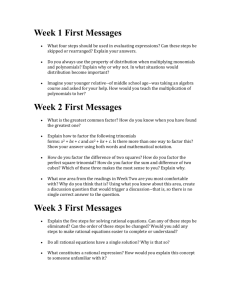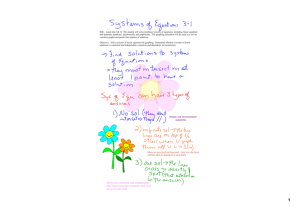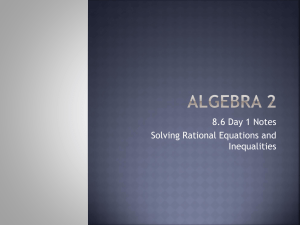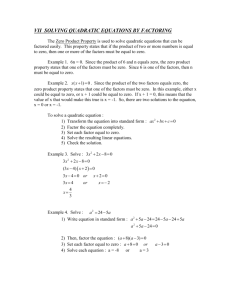Baton Rouge Community College Academic Affairs Master Syllabus Algebra for College Students
advertisement
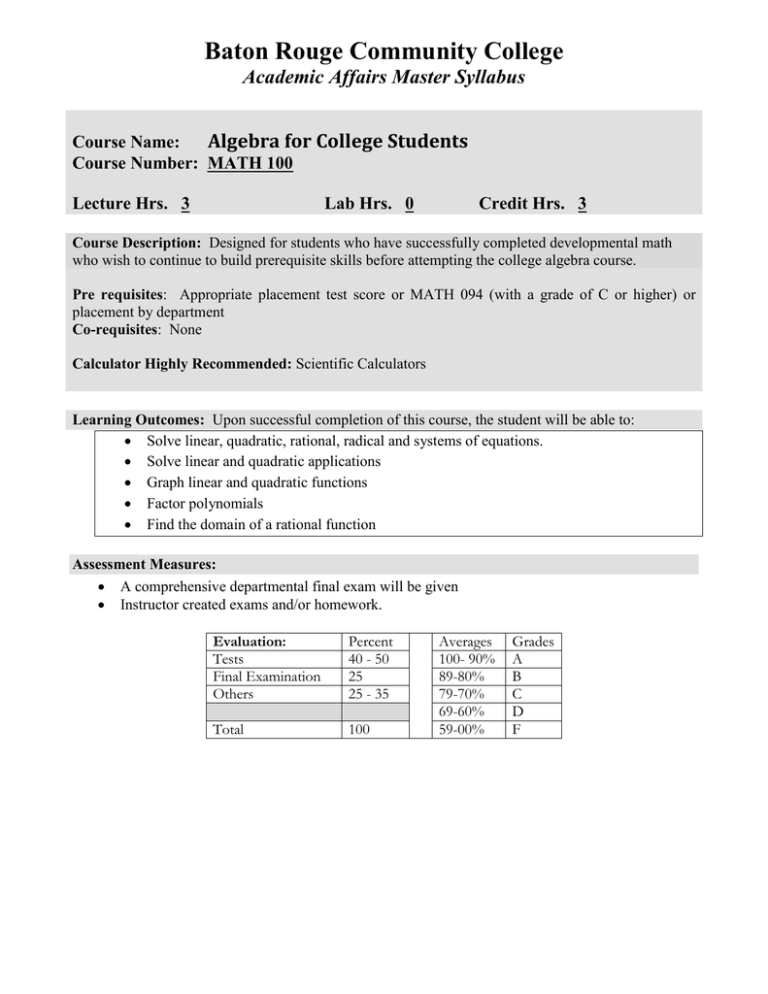
Baton Rouge Community College Academic Affairs Master Syllabus Course Name: Algebra for College Students Course Number: MATH 100 Lecture Hrs. 3 Lab Hrs. 0 Credit Hrs. 3 Course Description: Designed for students who have successfully completed developmental math who wish to continue to build prerequisite skills before attempting the college algebra course. Pre requisites: Appropriate placement test score or MATH 094 (with a grade of C or higher) or placement by department Co-requisites: None Calculator Highly Recommended: Scientific Calculators Learning Outcomes: Upon successful completion of this course, the student will be able to: Solve linear, quadratic, rational, radical and systems of equations. Solve linear and quadratic applications Graph linear and quadratic functions Factor polynomials Find the domain of a rational function Assessment Measures: A comprehensive departmental final exam will be given Instructor created exams and/or homework. Evaluation: Tests Final Examination Others Percent 40 - 50 25 25 - 35 Total 100 Averages 100- 90% 89-80% 79-70% 69-60% 59-00% Grades A B C D F “It is expected that all answers be accompanied by appropriate and supporting work that is logically presented using correct mathematical notation.” Information to be included on the Instructors’ Course Syllabi: Disability Statement: Baton Rouge Community College seeks to meet the needs of its students in many ways. “If a student has a disability that qualifies under the Americans with Disabilities Act and Section 504 of the Rehabilitation Act and requires accommodations, he/she should contact the Office of Disability Services for information on appropriate policies and procedures. Office of Disability Services is located on the main floor of the Student Center; their phone number is 225-216-8019.” Grading: The College grading policy should be included in the course syllabus. Any special practices should also go here. This should include the instructor’s and/or the department’s policy for make-up work. For example in a speech course, “Speeches not given on due date will receive no grade higher than a sixty” or “Make-up work will not be accepted after the last day of class.” Attendance Policy: Include the overall attendance policy of the college. Instructors may want to add additional information in individual syllabi to meet the needs of their courses. General Policies: Instructors’ policy on the use of things such as beepers and cell phones and/or hand held programmable calculators should be covered in this section. Cheating and Plagiarism: This must be included in all syllabi and should include the penalties for incidents in a given class. Students should have a clear idea of what constitutes cheating in a given course. Public Safety: BRCC believes that your safety is important in the learning process, and makes every effort to ensure that you are secure while on campus. Please report any activity that appears unusual to the Office of Public Safety at 216-8888. You may also use one of the red telephones in the halls, the blue light pole phones outdoors, or the garage emergency phones on all floors. Emergency text messaging and e-mail are available so that you are notified of any critical event. All students are strongly encouraged to register for this service by going on the BRCC web page and signing up on the Be Prepared-Hurricane Link or the e2 Campus Link for this important free service. Students should also familiarize themselves with the Emergency Response Plan posted in each classroom and note the Emergency Safe Zones, and exits in each building in which they attend class. Library/ Learning Resources: Since the development of the total person is part of our mission, assignments in the library and/or the Learning Resources Center should be included to assist students in enhancing skills and in using resources. Students should be encouraged to use the library for reading enjoyment as part of lifelong learning. Expanded Course Outline: 1: Equations and Inequalities a) Solving Linear Equations b) Problem Solving and Using Formulas c) Applications of Algebra d) Additional Application Problems e) Solving Linear Inequalities f) Solving equations and Inequalities containing Absolute Value 2: Graphs and Functions a) Graphs b) The Slope-Intercept Form of a linear Equation c) The Point Slope Form of a Linear Equation 3: Systems of Equations a) Solving Systems of Linear Equations in Two Variables 4: Rational Expressions and Equations a) The Domains of Rational Functions b) Addition and Subtraction of Rational Expressions c) Solving Rational Equations 5: Roots, Radicals, and Complex Numbers a) Roots and Radicals b) Rational Exponents c) Simplifying Radicals d) Adding, Subtracting, and Multiplying Radicals e) Dividing Radicals f) Solving Radical Equations g) Complex Numbers 6: Quadratic Functions a) Solving Quadratic Equations by factoring b) Solving Quadratic Equations by Completing the Square c) Solving Quadratic Equations by Using the Quadratic Formula d) Quadratic Equation: Applications and Problem Solving
